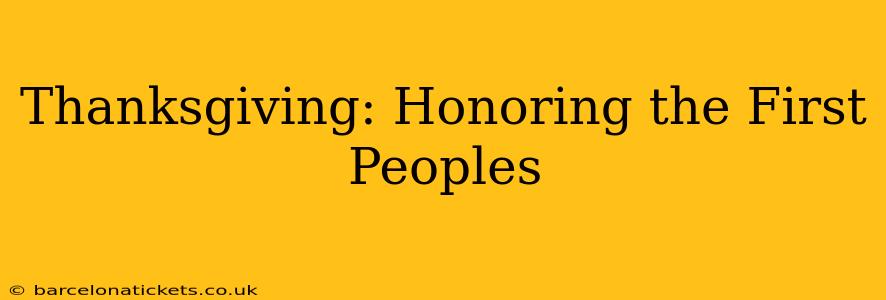Thanksgiving, a holiday celebrated annually in Canada and the United States, is a time for family, feasting, and reflection. However, the traditional narrative often overlooks a crucial aspect: the complex history and ongoing impact on the Indigenous peoples whose lands were, and continue to be, the stage for this celebration. This Thanksgiving, let's move beyond the simplified stories and delve into a more accurate and respectful understanding of the holiday's origins and its lasting consequences.
What is the true history of Thanksgiving?
The commonly told story of the first Thanksgiving—a peaceful gathering between Pilgrims and Wampanoag people—is a significant oversimplification. While a harvest celebration likely occurred in the fall of 1621, the relationship between the colonists and the Indigenous population was far more nuanced and often fraught with conflict. The arrival of European settlers marked the beginning of a devastating period of disease, displacement, and violence that decimated Indigenous populations and irrevocably altered their way of life. The "peaceful" narrative often ignores the subsequent centuries of broken treaties, forced assimilation, and ongoing struggles for land rights and self-determination. A more accurate understanding acknowledges the complex interplay of cooperation, conflict, and the ultimately devastating impact of colonization.
What is the significance of Thanksgiving for Native Americans?
For many Native Americans, Thanksgiving is a day of mourning, remembrance, and reflection on the historical and ongoing injustices inflicted upon their communities. It serves as a stark reminder of the loss of land, culture, and lives. It's a day to honor ancestors and to reaffirm their commitment to preserving their heritage and fighting for justice. The holiday represents a painful and complicated legacy, far removed from the celebratory image often portrayed. Many Indigenous communities hold alternative events and ceremonies on this day, focusing on remembrance, healing, and reaffirming their cultural identities.
How can I celebrate Thanksgiving in a culturally sensitive way?
Celebrating Thanksgiving in a culturally sensitive way requires acknowledging the complexities of its history and actively seeking to learn and understand the perspectives of Indigenous peoples. This includes:
- Educating yourself: Learn about the history of Thanksgiving from Indigenous perspectives. Read books, articles, and watch documentaries that accurately portray the events and their impact.
- Supporting Indigenous communities: Support Indigenous-owned businesses, organizations, and initiatives working to preserve their culture and advocate for their rights.
- Acknowledging the land: Recognize that you are celebrating on Indigenous land. Research the Indigenous peoples who historically inhabited the area where you live and acknowledge their presence and contributions.
- Challenging harmful stereotypes: Actively challenge inaccurate and stereotypical representations of Indigenous peoples in media and popular culture.
- Amplifying Indigenous voices: Seek out and share resources created by Indigenous peoples to ensure their stories are heard and understood.
Why is it important to acknowledge the Indigenous perspective on Thanksgiving?
Acknowledging the Indigenous perspective on Thanksgiving is crucial for several reasons:
- Historical accuracy: It ensures a more accurate and complete understanding of the holiday's origins and its impact.
- Social justice: It highlights the ongoing injustices faced by Indigenous communities and the need for reconciliation.
- Respect and empathy: It shows respect for the experiences and perspectives of Indigenous peoples.
- Cultural understanding: It promotes a broader and more nuanced understanding of different cultures and their histories.
- Building bridges: It helps build bridges between Indigenous and non-Indigenous communities by fostering dialogue and understanding.
This Thanksgiving, let's strive for a more accurate and respectful understanding of the holiday's significance. By acknowledging the contributions and the struggles of Indigenous peoples, we can move towards a more inclusive and meaningful celebration. Let us remember that Thanksgiving is not just about feasting and family, but also about acknowledging the past and working towards a more just and equitable future for all.

